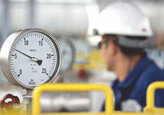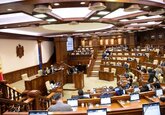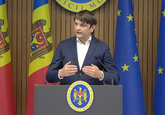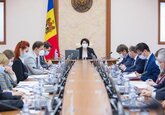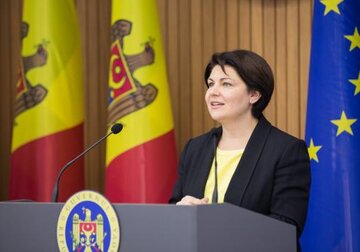
Moldovan government continues negotiations with Gazprom on gas supplies and gas price, and in parallel is holding discussions with various alternative suppliers to obtain the best price in the current difficult conditions - Natalia Gavrilita stated.
Prime Minister of Moldova stated this at a press conference while expressing confidence that in the end the country will not be left without gas, the only question is its new price. She assured that in any case, the tariff for natural gas for end consumers will not immediately increase, and the government will provide mechanisms to compensate for the increase in the cost of gas for different categories of citizens, depending on their income and consumption volumes, and will also provide support to enterprises, first of all, to social significant ones, from the bakery and dairy industry. Natalia Gavrilita noted that the negotiations are not easy. To facilitate this process, Dmitry Kozak, Deputy Head of the Presidential Administration of Russia, was invited to Chisinau, but his office said that he would not be able to visit Moldova this week. As a result, Deputy Prime Minister for Reintegration, Vlad Kulminski, will leave for Moscow on Thursday to continue discussions on this and other issues, to bring the matter to an end and agree on gas supplies and an acceptable price for it. Natalia Gavrilita noted that the negotiations are taking place in a specific context, when gas prices on the world market have risen sharply, and many European states have problems with gas supply and consider the current gas prices too high, and Moldova, despite the change of government, has always been a stable Gazprom partner and fulfilled the terms of the contract. According to her, there are some details about the negotiations that cannot be published now, so as not to harm the entire process, but they will be discussed later, if necessary. Prime Minister noted that Moldova has its own strategy, and in parallel the country is conducting discussions on gas supplies with other companies and countries, for example, with Romania, Ukraine, Poland and others. She recalled that, for example, today Deputy Prime Minister, Minister of Infrastructure and Regional Development, Andrei Spinu, during his working visit to Poland discusses issues of possible natural gas supplies to Moldova, later Deputy Prime Minister, Minister of Foreign Affairs and European Integration, Nicu Popescu, will go to Brussels and Bucharest, and then to Kiev. Natalia Gavrilita explained that Moldova will start purchasing gas from alternative suppliers through Energocom, and the budget will provide money for these purchases. The head of the Cabinet said that now the volume of gas supplied to Moldova from Gazprom is less than the required level. According to her, this week the government will make a decision to increase Energocom's authorized capital and permit purchases of gas from alternative sources. Prime Minister noted that the current situation confirms how important and correct was the decision to build the Iasi-Ungheni-Chisinau gas pipeline, stressing that Moldova received some gas volumes through it to balance the system. She did not name the volumes of supplies, noting that she could not give these details, but stressed that the Moldovan authorities are grateful to Romania and Ukraine for the dialogue to resolve gas problems. When asked why Vlad Kulminski and not President Maia Sandu went to Moscow for negotiations, Natalia Gavrilita stressed that Chisinau is open to communicate at all levels with Russian partners. “We have a bilateral agenda; we want to discuss the existing problems. At the beginning of November, MFAEI head, Nicu Popescu, will meet in Moscow with Russian Foreign Minister, Sergey Lavrov; we hope that it will become a good preparation for a future summit meeting,” Prime Minister said. The head of the Cabinet noted that Moldova has no problems with transporting gas to the country, and the problem is only in determining gas volumes and signing a contract with a purchase price that is profitable in the current difficult conditions. According to Prime Minister, maintaining high gas prices in the long term will have severe economic consequences for large European countries, not to mention small Moldova, but experts believe that the current abnormal situation on the gas market will not last long. Natalia Gavrilita recalled that in order to reduce gas consumption and reduce fuel costs, Termoelectrica was instructed to use fuel oil, which was allocated from the state reserve. Prime Minister explained that Moldova can still receive fuel oil from Romania as humanitarian aid or purchase it on the market. She noted that all over Europe, in the current conditions of a sharp rise in gas prices, companies that can operate on fuel oil are switching to it. Natalia Gavrilita stressed that Moldova also hopes for the help of the European Union in overcoming the gas crisis. “We are constantly engaged in discussions with partners in the EU about securing financing for development projects. Now we are discussing the provision of direct support to the budget in the context of the energy crisis, since we will need more resources to compensate socially vulnerable categories of consumers, energy complex enterprises, socially significant enterprises. We will talk about the amounts when the documents are signed. We are confident that we will be able to receive and use the money starting December,” the head of government said. She expressed confidence that Moldova will have a contract with Gazprom or another supplier in the interests of citizens. “We are discussing getting the best gas prices, looking for the best options for citizens. We cannot give all the details. We have a strategy for negotiations,” said Natalia Gavrilita. At the same time, she denied information that Chisinau asked Tiraspol to help in negotiations with Moscow on gas supplies. At the same time, Prime Minister said that she would talk with the head of Transnistria, Vadim Krasnoselsky, on overcoming the current gas crisis. // 19.10.2021- InfoMarket.



